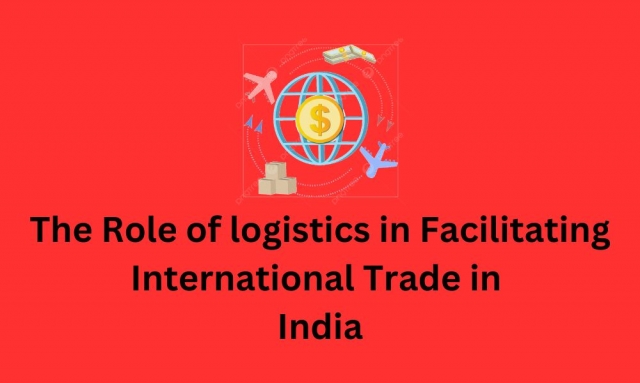The role of logistics in facilitating international trade in India

In today's globalized world, international trade has become an integral part of many businesses. To succeed in the highly competitive online marketplace, you need to ensure that your goods are delivered quickly, efficiently, and cost-effectively to your customers across the globe. This is where international logistics comes into play. In this blog post, we will explore the meaning of freight forwarding and the role of logistics in facilitating global trade in India.
Logistics and its role in international trade
Let’s begin with freight forwarding; it basically means the shipment of goods from one place to another through any mode of carrier. You can use the services of any freight forwarder or logistics partner to ensure the safe delivery of your products to your customer's doorstep. Logistics on the other hand refers to the entire management of the flow of goods and services from the point of origin to the point of consumption. In the context of international trade, logistics involves the movement of goods across borders, customs clearance, documentation, and compliance with trade regulations.
In India, logistics plays a critical role in facilitating international trade. Our country has a vast network of roads, railways, ports, and airports connecting it to major global markets. However, the logistics infrastructure in India is still evolving, and there are several challenges that ecommerce sellers need to navigate. Some of these include congestion at ports, inadequate storage facilities, and a lack of standardization in logistics processes.
Choosing a logistics partner for your online business
Selecting the right logistics partner is crucial for the success of your online business. Here are some factors to consider when choosing a logistics partner in India.
Experience: Look for a logistics partner such as NimbusPost that has a proven track record of handling international shipments. Check their credentials, reviews, and references from other ecommerce sellers.
Range of services: Partner with a logistics company that offers a range of services, such as customs clearance, warehousing, and last-mile delivery. This will help you save time and money by avoiding the need to work with multiple logistics providers.
Technology: In today’s tech-forward world, always look for a logistics partner who uses technology to optimize their operations, track shipments, and provide real-time visibility into the movement of goods.
Cost-effectiveness: Don’t forget to consider the costs associated with different logistics providers and choose one that offers competitive pricing while still providing high-quality services.
Customer service: Choose a logistics partner who provides excellent customer service, responds promptly to queries, and keeps you updated on the status of your shipments.
Conclusion
Logistics plays a crucial role in facilitating international trade in India, and eCommerce sellers need to choose the right logistics partner to ensure that their goods reach their customers across the globe quickly, efficiently, and cost-effectively. By considering factors such as experience, range of services, technology, cost-effectiveness, and customer service, eCommerce sellers can select a logistics partner that meets their unique needs and helps them grow their business.
Comments
Post a Comment